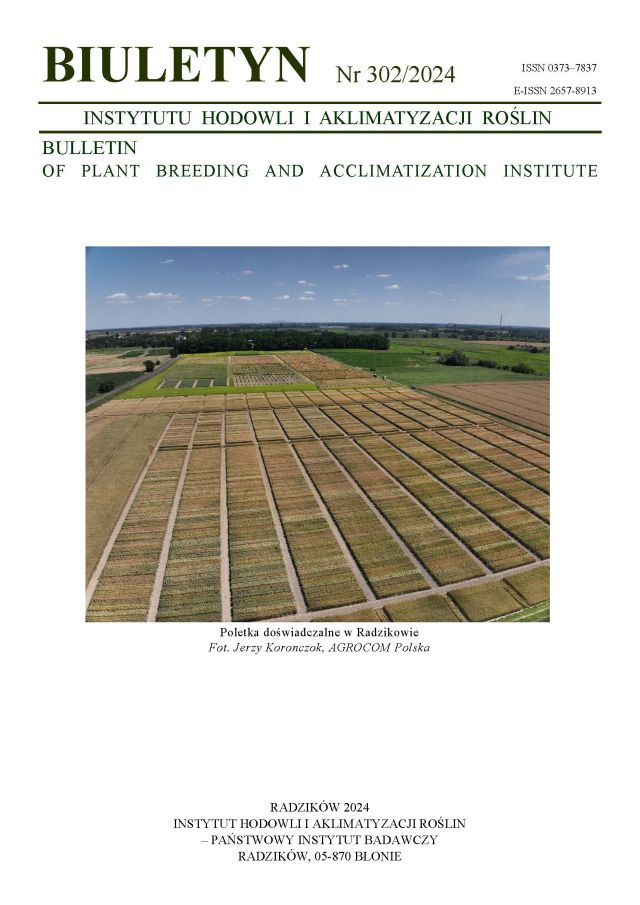Border effect in experimental study with sowing rate of oat
Franciszek Rudnicki
biuro.dziekana.wrib@pbs.edu.plKatedra Podstaw Produkcji Roślinnej i Doświadczalnictwa, Akademia Techniczno-Rolnicza w Bydgoszczy (Poland)
Lech Gałęzewski
Katedra Podstaw Produkcji Roślinnej i Doświadczalnictwa, Akademia Techniczno-Rolnicza w Bydgoszczy (Poland)
Abstract
The experimental trials on the border effect occurring in oat plots were carried out in 2002–2004. Four various densities of oat: 140, 280, 420 and 560 seed per m2 were investigated and the plots were separated with 30 cm wide paths. The oat individuals planted in the marginal rows adjacent to the path produced: greater biomass, longer stems, more abundant panicles, more productive tillers and they yielded higher than the oat in the center of the plots. The strongest response was noticed on the green biomass, grain yield and productive tillering. The border effects on the rye type good soil varied significantly in seasons with different rainfalls and were maximized in the drought. The increasing density from 140 to 420 of oat seed per m2 favoured the border effect, but there was no further reaction when oat was planted as 560 seed per m2. The assessment of yield on the harvested plots was overdone by the border effects giving 20.5% higher estimation (0.88 t·ha-1) then the real yield. To minimize the border effect in trials with oat experimental plots should be large and of square shape or the rows adjacent to the paths should stay not harvested.
Keywords:
border effect, sowing rate, oat, yieldReferences
Braun H. 1978. Tramlines in corn. International Pest Control. Sept-Oct: 16 — 18.
Google Scholar
Filipiak K., Krzymuski J. 1996. Substytucja i komplementarność eksperymentu w badaniach rolniczych. Zesz. Probl. Post. Nauk Roln. 447: 27 — 41.
Google Scholar
Gomez K. A., Gomez A. A. 1984. Statistical procedures for agricultural research. John Wiley & Sons Inc., New York.
Google Scholar
Hulbert H., Remsberg J. D. 1927. Influence of border rows in variety testes of small grains. J. Am. Soc. Agron. 19 (70): 585 — 589.
DOI: https://doi.org/10.2134/agronj1927.00021962001900070004x
Google Scholar
Kozłowska-Ptaszyńska Z., Pawłowska J., Woch J. 2001. Wpływ terminu i gęstości siewu na plonowanie nowych odmian owsa. Biul. IHAR 217: 121 — 126.
Google Scholar
Niemczyk H. 1993. Zdolność zbóż do wyrównania plonu z nie obsianej powierzchni ścieżek przejazdowych. Cz. I. Pszenica ozima i jara, Rocz. Nauk Roln. A 109, 4: 9 — 19.
Google Scholar
Niemczyk H., Radecki A. 1993 a. Zdolność zbóż do wyrównania plonu z nieobsianej powierzchni ścieżek przejazdowych. Cz. II Jęczmień ozimy i jary, Rocz. Nauk Roln., A-109 (4): 21 — 30.
Google Scholar
Niemczyk H., Radecki A. 1993 b. Zdolność zbóż do wyrównania plonu z nie obsianej powierzchni ścieżek przejazdowych. Cz. III Żyto i owies, Rocz. Nauk Roln. A 109-4: 31 — 40.
Google Scholar
Pacewicz K. 2000. Efekt brzeżny w doświadczeniach z pszenicą jarą i jęczmieniem jarym. Rozpr. dokt., AR Szczecin.
Google Scholar
Stawiana-Kosiorek A., Gołaszewski J., Załuski D. 2003. Konkurencyjność roślin w doświadczeniach hodowlanych z grochem siewnym. I. Oddziaływania brzegowe. Biul. IHAR 226/227/2: 425 — 439.
Google Scholar
Authors
Franciszek Rudnickibiuro.dziekana.wrib@pbs.edu.pl
Katedra Podstaw Produkcji Roślinnej i Doświadczalnictwa, Akademia Techniczno-Rolnicza w Bydgoszczy Poland
Authors
Lech GałęzewskiKatedra Podstaw Produkcji Roślinnej i Doświadczalnictwa, Akademia Techniczno-Rolnicza w Bydgoszczy Poland
Statistics
Abstract views: 62PDF downloads: 29
License
Copyright (c) 2006 Franciszek Rudnicki, Lech Gałęzewski

This work is licensed under a Creative Commons Attribution-ShareAlike 4.0 International License.
Upon submitting the article, the Authors grant the Publisher a non-exclusive and free license to use the article for an indefinite period of time throughout the world in the following fields of use:
- Production and reproduction of copies of the article using a specific technique, including printing and digital technology.
- Placing on the market, lending or renting the original or copies of the article.
- Public performance, exhibition, display, reproduction, broadcasting and re-broadcasting, as well as making the article publicly available in such a way that everyone can access it at a place and time of their choice.
- Including the article in a collective work.
- Uploading an article in electronic form to electronic platforms or otherwise introducing an article in electronic form to the Internet or other network.
- Dissemination of the article in electronic form on the Internet or other network, in collective work as well as independently.
- Making the article available in an electronic version in such a way that everyone can access it at a place and time of their choice, in particular via the Internet.
Authors by sending a request for publication:
- They consent to the publication of the article in the journal,
- They agree to give the publication a DOI (Digital Object Identifier),
- They undertake to comply with the publishing house's code of ethics in accordance with the guidelines of the Committee on Publication Ethics (COPE), (http://ihar.edu.pl/biblioteka_i_wydawnictwa.php),
- They consent to the articles being made available in electronic form under the CC BY-SA 4.0 license, in open access,
- They agree to send article metadata to commercial and non-commercial journal indexing databases.
Most read articles by the same author(s)
- Franciszek Rudnicki, Breeding progress of winter triticale in years 1982–2012. I. Yield and some of grain characteristics , Bulletin of Plant Breeding and Acclimatization Institute: No. 273 (2014): Regular issue
- Franciszek Rudnicki, Breeding progress of winter triticale in years 1982–2012. II. Resistance to biotic and abiotic stresses , Bulletin of Plant Breeding and Acclimatization Institute: No. 273 (2014): Regular issue
- Franciszek Rudnicki, Method for evaluation with indicators of the breeding progress introduced by plant cultivars , Bulletin of Plant Breeding and Acclimatization Institute: No. 273 (2014): Regular issue














